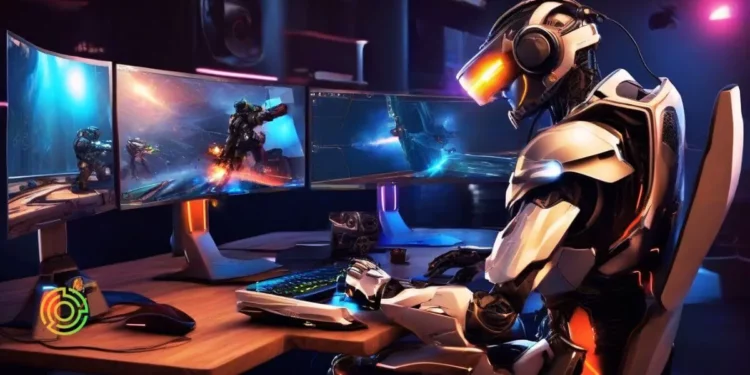Artificial Intelligence (AI) has not only transformed various industries but has also found a significant place in the world of gaming. From enhancing graphics to creating dynamic storylines, AI has taken gaming to new heights, providing players with a more immersive and personalized experience.
Definition of Artificial Intelligence
To start our journey into the role of AI in gaming, let’s first understand what artificial intelligence entails. AI refers to the simulation of human intelligence in machines, allowing them to perform tasks that typically require human intelligence, such as learning, problem-solving, and decision-making.
Overview of Gaming Industry
The gaming industry has witnessed remarkable growth, evolving from pixelated screens to sophisticated virtual worlds. As technology advances, so does the integration of AI in gaming, revolutionizing the way we play and experience games.
The Evolution of AI in Gaming
Early AI in Games
In the early days of gaming, AI was primarily used to create opponents with predetermined behaviors. These rudimentary systems laid the foundation for the complex AI we see today, shaping the gaming landscape.
Advancements in Machine Learning
The real game-changer came with advancements in machine learning. Modern games use sophisticated algorithms that enable AI to learn and adapt, providing players with dynamic and challenging experiences.
AI and Game Development
Procedural Content Generation
AI plays a pivotal role in generating game content, from landscapes to characters. Procedural content generation ensures that no two gaming experiences are alike, keeping players engaged and excited.
Meet Humane’s AI Pin, the Future of Wearable Technology
Character Behavior and Learning
Gone are the days of predictable non-player characters (NPCs). AI-driven characters now learn from player interactions, making them more realistic and responsive to the gaming environment.
Enhanced Player Experience
Personalized Gaming
AI analyzes player behavior and preferences, tailoring gaming experiences to individual tastes. This personalization creates a deeper connection between the player and the game world.
Adaptive Difficulty Levels
No one likes a game that’s too easy or impossibly hard. AI adjusts difficulty levels based on player skill, ensuring a challenging yet enjoyable experience for all.
AI-driven Graphics and Sound
Realistic Environments
AI contributes to stunning visuals by dynamically adjusting graphics based on the player’s hardware and preferences. This ensures that even lower-spec devices can enjoy visually rich games.
Dynamic Soundscapes
Immersive soundscapes add another layer to gaming experiences. AI adjusts in-game sounds based on player actions and surroundings, creating a more realistic and engaging auditory experience.
AI in Virtual Reality (VR) Gaming
Immersive Experiences
AI enhances the immersion in virtual reality gaming by creating realistic interactions and scenarios. From lifelike gestures to dynamic environments, AI amplifies the sense of presence in VR.
Natural Interactions
Players can now interact more naturally with AI characters in VR. Conversations and actions feel organic, blurring the line between the virtual and real worlds.
AI-Generated Storylines
Dynamic Narratives
AI-driven storytelling introduces dynamic narratives that evolve based on player choices. This non-linear approach adds replay value, as each playthrough can lead to unique outcomes.
Player Choices and Consequences
Every decision a player makes can influence the game’s storyline. AI processes these choices, creating branching narratives with consequences that resonate throughout the game.
Challenges and Ethical Considerations
Bias in AI Gaming Systems
One challenge is the potential bias in AI algorithms, affecting in-game decisions and experiences. Game developers must address these biases to ensure fairness and inclusivity.
Ensuring Fairness and Inclusivity
Developers are actively working to create AI systems that are fair and inclusive. Ethical considerations play a crucial role in shaping the future of AI in gaming.
Future Trends in AI Gaming
AI-powered Virtual Game Assistants
Imagine having a personal AI assistant within a game, providing tips, guidance, and even participating in the adventure. This trend opens up new possibilities for player interaction.
Integration with Augmented Reality (AR)
The integration of AI with AR brings gaming into the real world. Imagine battling virtual creatures in your backyard or solving puzzles on your kitchen table—AR blurs the boundaries between the game and reality.
Impact on the Gaming Industry
Market Trends
The integration of AI has not only elevated gaming experiences but has also influenced market trends. Games that leverage AI capabilities often garner more attention and success in the competitive gaming industry.
Microsoft partners with Inworld AI to power AI characters for Xbox games
Opportunities and Challenges
While AI presents numerous opportunities for innovation, it also poses challenges that developers must navigate. Striking the right balance is crucial for the sustained growth of AI in gaming.
Conclusion
In conclusion, the role of artificial intelligence in gaming is nothing short of revolutionary. From shaping characters’ behaviors to creating dynamic storylines, AI has become an indispensable part of the gaming experience.
As technology continues to advance, the future holds even more exciting possibilities for AI in gaming. From AI-powered virtual game assistants to seamless integration with AR, the gaming landscape is set to evolve in ways we can only imagine.
FAQs
How does AI enhance player experiences in gaming?
AI enhances player experiences by personalizing games, adapting difficulty levels, and creating dynamic content based on player behavior.
What ethical considerations are involved in AI gaming development?
Developers must address biases in AI algorithms to ensure fair and inclusive gaming experiences. Ethical considerations play a crucial role in shaping the future of AI in gaming.
What is procedural content generation, and how does it impact gaming?
Procedural content generation is the use of algorithms to create game content dynamically. It ensures that no two gaming experiences are alike, keeping players engaged.
How does AI contribute to virtual reality gaming?
AI enhances virtual reality gaming by creating immersive experiences with realistic interactions, lifelike gestures, and dynamic environments.
What trends can we expect in the future of AI gaming?
The future of AI gaming includes AI-powered virtual game assistants and integration with augmented reality, bringing gaming experiences into the real world.
Follow us on our social networks and keep up to date with everything that happens in the Metaverse!
Twitter Linkedin Facebook Telegram Instagram Google NewsAmazon Store











































